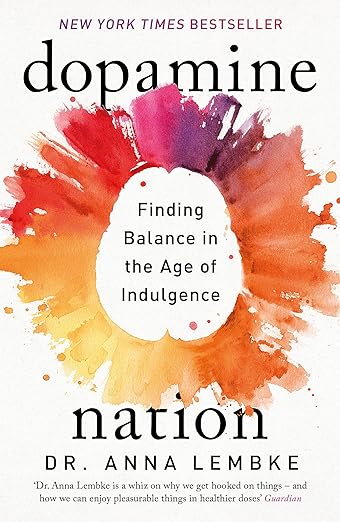Today, we embark on the fascinating journey of dopamine and its influence on mental health. This neurotransmitter, often dubbed the “happiness molecule,” affects our well-being and unleashes a barrel of emotions and motivations. We will also uncover a well-known American psychiatrist, Dr. Anna Lembke, and view her video and book on rewiring your dopamine system. So, let’s dive straight in.
What is the Dopamine Influence?
Ever wondered about the tiny chemical powerhouse in your brain steering your mental health ship? Enter dopamine! It is not just a chemical reaction; it’s the architect of joy in our brains.
Picture this: You accomplish a task, big or small, and dopamine floods your neural pathways, creating a sensation of pleasure. The brain says jump, and dopamine says, “How high?” Then it produces a flurry of mental experiences, reinforcing positive behaviours and leaving you wanting more.
Dopamine celebrates your successes and fine-tunes your focus, directing your attention toward opportunities for growth and fulfilment. This neurotransmitter influences your drive and determination. Making even the most challenging tasks achievable. It’s the secret pleasurable sauce that turns goals into realities.
Emotional Resilience: Weathering Life’s Storms:
As you journey through life, dopamine becomes the architect of your future horizons. Reinforcing positive behaviours, fostering motivation, and enhancing your overall well-being, laying the foundation for a brighter and more fulfilling tomorrow. The guiding force propels you toward a future filled with purpose and accomplishment. It helps you bounce back from setbacks and challenges. The anchor steadies your emotional ship, ensuring you navigate the turbulent waters with strength and resilience,
Dopamine: Mental Health Hacks: Cultivating a Happy Brain:
You can elevate your mood naturally! Dopamine-rich foods like dark chocolate and berries are delicious mental health boosters. Engaging in regular physical activity not only improves your mood but also contributes to long-term mental wellness. Whether it is spending time with loved ones, pursuing hobbies, or enjoying a good laugh, laughter is the best medicine. It triggers a dopamine explosion in your brain and contributes to a more robust mental well-being.
ADVERTISING

Embark on a transformative journey with ” by Dr. Anna Lembke, a beacon of insight in our wired world. Lori Gottlieb hails it as a life-altering narrative, while Daniel Levitin applauds its revolutionary perspective on mental health, pleasure, and stress.
This New York Times and Sunday Times bestseller is a wake-up call in a society pulsating with high-reward stimuli. From social media to shopping, Dr. Lembke unravels the addictive threads that weave through our lives, causing pain in the pursuit of fleeting pleasures.
The Dopamine Addictive Spiral:
Substances like alcohol or behaviours like gambling can trigger a massive release of dopamine, creating an intense and immediate sense of pleasure. Your brain is wired to seek pleasure and avoid pain. It registers the high as an enriching experience, leaving your brain asking for more!
As the cycle continues, the brain adapts. It may reduce the number of dopamine receptors or the amount produced, diminishing the response to everyday pleasures. This leads to tolerance, where individuals require more of the addictive substance or behaviour to achieve the same level of pleasure.
As addiction progresses, the brain’s control mechanisms become compromised. The prefrontal cortex, responsible for decision-making and impulse control, struggles to counteract the powerful drive it creates. This results in compulsive behaviours, where individuals find it challenging to resist the urge to engage in the addictive activity despite adverse consequences.
Understanding the role of dopamine in addiction is crucial for developing effective interventions. Treatment strategies often aim to restore a balance in the dopamine system, addressing both the physical and psychological aspects of addiction. Behavioural therapies, counselling, and, in some cases, medication can be part of a comprehensive approach to help individuals regain control over their lives.
Signs, Symptoms, and Solutions:
When dopamine levels dip, a symphony of symptoms begins to play, echoing mood swings, dwindling motivation, and, in some instances, the ominous notes of depression. This silent struggle often manifests as unexplained shifts in mood, leaving individuals navigating a rollercoaster of emotions. A lack of motivation may transform once-thriving ambitions into distant aspirations, and persistent fatigue may cast a shadow over their everyday life.
Recognising these subtle signals is the crucial first step toward understanding their role in mental health. By acknowledging their significance, we open the door to proactive solutions and embark on a journey toward mental well-being.
The Hidden Driver of Mental Health by Dr Anna Lembke.
What’s the Research?
Research on dopamine and mental health is vast and continually evolving. It covers various aspects of dopamine’s role in the brain, its impact on behaviours, and its involvement in different psychological and physical health conditions. Here are some critical areas of research.
A significant focus of research is on dopamine’s involvement in the brain’s reward system. Studies explore how dopamine contributes to the experience of pleasure, reinforcement of behaviour, and motivation.
It also investigates how drugs and specific behaviours, such as gambling or gaming, impact the release of dopamine and how alterations in the dopaminergic system contribute to addiction.
As we unravel the complexities of addictive behaviours, we gain insights into the challenges faced by those grappling with addiction. This understanding informs therapeutic approaches and fosters empathy and compassion for individuals.
So, as we navigate the issues cast by dopamine deficiency, let’s approach the journey with compassion and curiosity. Let’s embrace its magic, savour the joy it brings, and dance our way to better mental well-being. Understanding these signals not only unravels the mysteries of our mental health but also empowers us to take intentional steps toward a brighter, more balanced future.
” Just as dopamine shapes the dynamics in our brains, let kindness and understanding enrich our quest for knowledge.”
Molly
